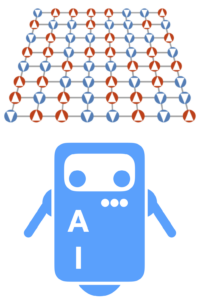
Seminar: Machine Learning Quantum Matter
The field of machine learning and artificial intelligence has flourished over the past years, fueled by a new generation of algorithms, ever growing resources of computational power, and the availability of “big data” in many fields. These technological advances have a strong impact also on the natural sciences — just recently, for example, the AlphaFold machine learning algorithm set new standards in the fundamentally difficult problem of protein folding. These developments have motivated researchers across all fields to explore machine learning techniques as an extension of their numerical toolbox.
In this seminar, we will concentrate mostly on applications of machine learning (ML) in condensed matter physics. This is a perfect match: The core functionality of ML — pattern recognition and dimensional reduction— might be precisely what is needed to cure the “curse of dimensionality”, i.e. the exponential explosion of states in a Hilbert space, while, e.g., typical wavefunctions of quantum many-body systems are known to be “relatively simple”, occupying only a few important basis states. This suggests novel routes for data analysis and numerical simulation, but also inspires new conceptional developments. The talks will provide a basic introduction to various machine learning techniques by considering exemplary applications in condensed matter physics. A tentative list of topics is included below.
Organizatorial Info
The seminar will take place on Mondays at 4pm.
Schedule
| Date | Topic | Presenter | Tutor |
|---|---|---|---|
| 26.4. | Hands-on tutorial: Supervised learning with neural networks | Markus | |
| 3.5. | Supervised learning of many-body phases | Nikkin | Markus |
| 10.5. | Unsupervised learning of phase transitions | Simon-Dominik | Kai |
| 31.5. | Generative modelling for statistical physics | Rajat | Chae-Yeun |
| 7.6. | Neural network wave functions | Ana-Luiza | Chae-Yeun |
| 14.6. | Neural network quantum state tomography | Mo | Chae-Yeun |
| 21.6. | Machine learning to analyze experimental data | Bernhard | Markus |
| 28.6. | Reinforcement learning for quantum control | Jason | Markus |
| 5.7. | Reinforcement learning for quantum error correction | Sakshi | Kai |
| 12.7. | Quantum machine learning | Julius | Chae-Yeun |
| 19.7. | Discovering physical concepts | Jiangtian | Markus |
Materials
- For more details about topics, see the slides for the introductory session.
- For a nice introduction to the basics of deep learning, see the first chapter of M. Nielsen’s online book “Neural networks and deep learning”.
- A rapid introduction to the basics of ML techniques relevant for this Seminar in the form of Jupyter notebooks on GitHub.